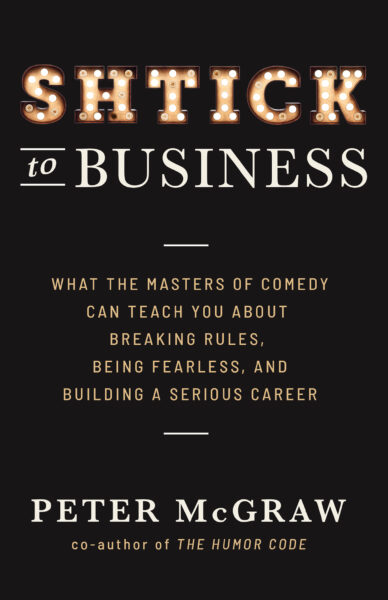What do comedians know about killing it in business? Just ask a behavioral economist who teaches MBAs by day and decodes comedy by night. Dr. Peter McGraw—a business school professor, professional speaker, and founder of the Humor Research Lab (aka HuRL)—set out to translate the genius and madness of the world’s funniest people into powerful prescriptions for professional success. Drawing on cutting-edge research, case studies, and his own comedy successes (and failures), Peter shares surprising business lessons from the likes of Bill Murray, Groucho Marx, Dave Chappelle, Joan Rivers, Tiny Fey, Amy Poehler, and Jerry Seinfeld.

The insights in Shtick to Business will help readers improve innovation and outsmart the competition. They’ll build new skills—enhanced creativity, better decision-making, and a marketing mindset—to launch a business, tackle tough management problems, and build a serious career. And best of all, they’ll never have to tell a joke.
I recently sat down with Peter to learn what inspired him to write the book, his favorite idea that he shares with readers, and how he’s applied that lesson to his own life.
What happened that made you decide to write the book? What was the exact moment when you realized these ideas needed to get out there?
The idea behind Shtick to Business was the outgrowth of my desire to bring together my day job (teaching MBAs) and my night job (decoding comedy). With my first book, The Humor Code, they were largely separate and I was looking for an opportunity to impart some wisdom on a more professional crowd. The Humor Code satisfies a curiosity: what makes things funny and what’s comedy like around the world? But it doesn’t solve a big problem.

I was seeking out problems to solve. My first instinct—what Lorne Michaels would call my “first premise”—was to write a book about humor and leadership. How could leaders use humor to motivate those they lead? But I quickly realized that idea didn’t lend itself to a book. I didn’t want to stand in front of a room full of people and tell them to go be funnier at work. We all know how that would end up, so I decided not to write a book about humor and leadership.
The moment of clarity came when I was asked to give a talk about the business of humor and I realized: It’s not about getting ahead in business by being funnier. It’s about using the practice and perspectives that underlie comedy, that help make this difficult product (getting laughs) look easy. How can we apply these insights to organizations that need help delighting customers with product, cutting through the clutter with marketing communications, while also helping the employee who’s looking to excel at work. Business rewards people who think differently, and the world’s funniest people think more differently than nearly everyone else.
What’s your favorite specific, actionable idea in the book?
One of my early readers said she’d never once read about the value of writing. One of the chapters is called “Write It or Regret It” that reveals how the world’s funniest people have a practice of writing their ideas down. They do this for three reasons.
First, they make an observation and they record it; otherwise, it goes away. Second, the act of writing helps them clarify and develop an idea. Third, writing helps them to communicate that idea with the world. The business world needs your ideas, so be sure to write them down!
What’s a story of how you’ve applied this lesson in your own life? What has this lesson done for you?
Going hand-in-hand with this idea is the concept of the one pager. I love the one pager because it forces me to be very concise with what I’m saying. For The Humor Code, my coauthor and I worked for six weeks on our one pager before we wrote our book proposal. It only took us three weeks to write the book proposal because we did the heavy lifting developing and clarifying our idea while we worked on the one pager. When you read the one pager for Shtick to Business, it looks very similar to what you get in the book since that exercise clarified my ideas so much.
To learn more about the practices and habits that make the masters of comedy so effective, you can find Shtick to Business: What the Masters of Comedy Can Teach You about Breaking Rules, Being Fearless, and Building a Serious Career on Amazon.